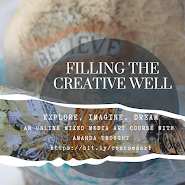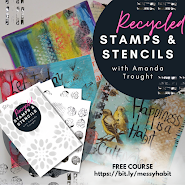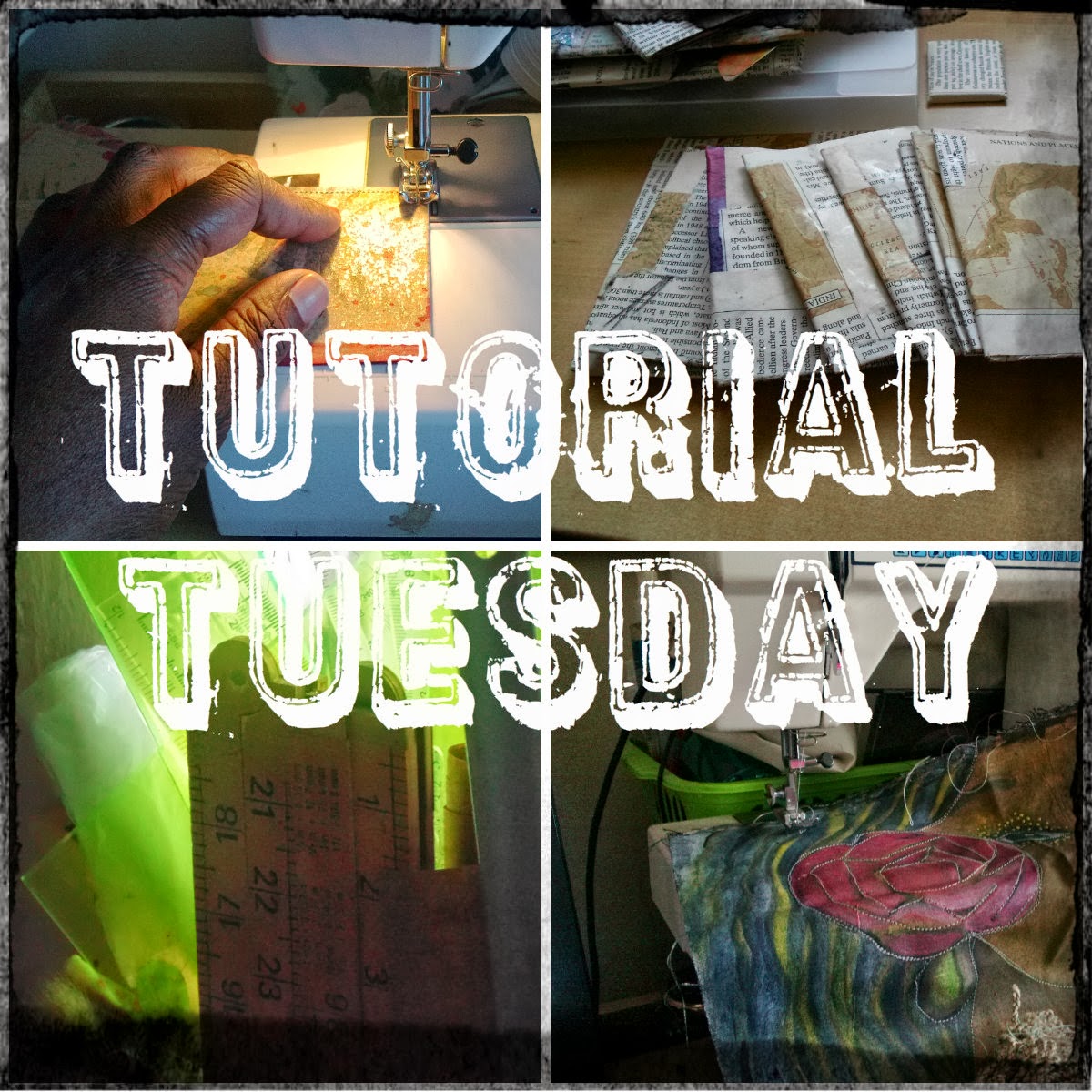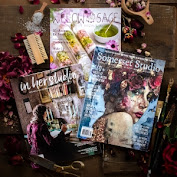In today's show I share with you my work in the field of Arts and Health.
As a mixed media artist I work with a variety of mediums and tools to express myself in my work. I completed my degree in Complimentary Therapy, at the University of Westminster specializing in Nutrition and Massage Therapy, and saw the benefits of improving diet and the use of different forms of massage and essential oils. I could see clearly the link between diet, health and well-being. Alongside this I painted and wrote about art and creativity, and wanted to further explore the impact of creative activities on our health and well-being.
Inspiration
My journey into Art and Health started to take shape after my mother was diagnosed with Alzheimer’s. I was making the transition to a self-employed artist and I was driven to look at meaningful ways that art could impact on others and enable me to share my passion. By chance I asked my mum if she wanted to do some art she would normally say no, this time asked what I wanted her to draw. I gave her a picture and paper and some art supplies and said, try this and she didn’t look back. I was shocked that an hour and a half later my mother was still engaged and enjoying drawing her version of the image I had given her.
As the years went by I gave my mum more and more creative things to do. I realized that Art could play a big part in working with those who had physical or mental health challenges, including those whose illness caused mental distress for themselves and those who cared for them. Art could impact and benefit people from all walks of life and act as a preventative measure.
 |
| My Mother Mavis enjoying her art activity |
I started to do my own research and training, looking at ways to develop workshops that could impact on the health and well-being of the participants whether they presented with a health challenge or not. I ran art and creativity workshops for a special Dementia Day Care Center in London for those with varying degrees of Dementia and other conditions for over 3 years and alongside this presented on a local radio show talking about creativity and the positive health benefits that can be gained and I collaborated with other artists and spoke at seminars and conferences on the benefits of creative activity.
The Need for Research
There has been quite a lot of research done on the impact of the arts and health across the board especially in the UK and the USA, and wider afield not only visual art, but dance, theatre, music, storytelling and more;
- The arts are being used in different health environments hospitals, homes, centers, waiting rooms where both for staff, visitors and patients were being impacted in a positive way, both as active and passive participants;
- Stroke, Children’s, geriatric and cancer wards found that art and creative activities helped patients deal with the emotional stress that was a result of their illness and the proceeding isolation;
- Art and colour is often used to design interior and public outdoor health spaces, across communities and there seem to be whole movement of people who could give positive feedback to the work they had been doing in the creative field;
- It has been identified with providing solutions and as a means of prevention, to those who previously would have been prescribed antidepressants, or it has been shown as an outlet for people who are isolated or feel lonely;
- Where arts and creative activity were being promoted in the local community it got individuals out of the house, and programs were developed which also impacted on their physical health and nutrition.
I further enhanced my training with a series of courses that led me look at how to setup a social enterprise that supported, engaged and encouraged the community. I also looked at the ways in which you could to use reminiscence in a creative way, and measure the impact of the work done.
I created a series of creative reminiscence programs that included music, art, and discussion in a relaxed atmosphere, and followed on not only working with those with dementia, but their carers and others working in a health care environment. I also had the opportunity to do a series of training seminars in France and Norway and give presentations on my work with the elderly in the UK.
I was also involved in a project called Community Health Lab - ‘Art on Prescription’ with a remit to show how effective a creative activity could be on improving the lives of the ‘hard to reach’ communities. Included on the program was dance, movement, horticulture and art therapy. We received funding to work with artists and creatives across the board to deliver a program where individuals could either self-refer or be referred by their GP to take part in a series of 6 workshops.
We were able to show through monitoring their blood pressure, and weight, and a general mental health questionnaire at the beginning and end of the program that taking part in the workshops had a specific impact on the participant’s health and well-being and they also showed improvement in any feelings of isolation. Art Therapists have been recognized by the NHS and work in all areas of health, combined with a large number of artists who use art as a therapeutic tool.
Realityarts – Creativity for Change
I set up Realityarts – Creativity for Change, which seeks to engage, encourage and inspire individuals in the use of art and creativity and bring about change in their health. I feel that it is important that we connect and impact communities with inter-generational arts projects so we get people across generations sharing their experience and learning from each other. I am passionate about creativity, and getting people involved in some way, looking at ways in which we can use art to communicate, tell our stories and share these stories that tell of our own journeys.
Art as a therapeutic tool
I believe that the creative process is very important and everyone one can get involved in some way – even if it is just to visit an art exhibition or go and see a play or open air event. When we have access to the arts across all levels of society we can see the positive impact on communities and lives, we hear about the stories and traditions, the old wives tales and the ‘stories ‘granny’ used to tell’. It helps bring together the different generations of a community, it passes on the history and is captured through the creative activity.
Art as a therapeutic tool
I believe that the creative process is very important and everyone one can get involved in some way – even if it is just to visit an art exhibition or go and see a play or open air event. When we have access to the arts across all levels of society we can see the positive impact on communities and lives, we hear about the stories and traditions, the old wives tales and the ‘stories ‘granny’ used to tell’. It helps bring together the different generations of a community, it passes on the history and is captured through the creative activity.
Developing art programs can have several benefits:
· Arts programs have powerful results that can have a positive effect on physical health, mental health, and it also helps improve social functioning.
· Arts and Creativity activity is important for our development. For the older adults it is vitally important that there is a continued emphasis on helping them to keep active and mentally stimulated.
· Involvement in programs that calls on older adults to participate, sharing their knowledge, wisdom and stories has been shown to impact on their health and encourages older adults in maintaining their independence and decrease feelings of depression and loneliness.
· Arts programs have powerful results that can have a positive effect on physical health, mental health, and it also helps improve social functioning.
· Arts and Creativity activity is important for our development. For the older adults it is vitally important that there is a continued emphasis on helping them to keep active and mentally stimulated.
· Involvement in programs that calls on older adults to participate, sharing their knowledge, wisdom and stories has been shown to impact on their health and encourages older adults in maintaining their independence and decrease feelings of depression and loneliness.
Reminiscence is a way of calling the past to mind, particularly positive events, people, or places, to improve older adults' outlook on the present by increasing socialization and self-esteem, improving communication skills, and reducing isolation and anxiety. Listening to music and telling stories stimulate participants to resurrect these memories and focus on what remains.
The arts contribute to communicating, building a sense of identity, and strengthening social networks in communities.
The arts help create elder-friendly communities in which older adults are able to thrive and function regardless of their ability.
Art in the Environment
There are so many ways in which art and creativity can impact on the health of an individual not just in an art session, but also within the environment. Health organisations and departments in the UK continually look at ways to improve the working environment that also benefits the patients with initiatives such as Paintings in Hospitals, Hospital waiting area exhibitions, and music recitals all which go to lifting up the spirits of those who work or who are being treated. There are many other initiatives that have been promoted.
I currently run an online network for NHS organisations who want to connect with other like-minded organisations developing work in Arts and Health. I work online with other artists creating and developing art workshops which look at the way in which we can encourage the community, using art, art journalling, and art as a therapeutic tool to working on a deeper level that will improve health and well-being. I also run art and creativity workshops and seminars helping organisation’s develop their own programs for staff and the local community and look at the impact of art and creativity on our health. I also create videos of art processes, health, gardening on my YouTube channel. This has also extended over social media where I work with artists and small businesses and offer consultations helping them to develop creative ways to improve their social media presence.
I have worked with the the Barbados Alzheimer’s Association, giving talks at their conferences, Seminars and Participation program about my role as a carer to those affected by dementia and those working in health care and how you can use creative activities. You need to equip yourself with information and knowledge, more and more people are affected - the whole community, and it is important to attend some of the sessions that are run and get involved in the work they are doing.
I would love you to be able to access more things without breaking the bank that you can use as a creative activity. If you would like to work with me or looking for some encouragement to undertake your creative activity you can schedule 2 Free Sessions of Creative Encouragement
 |
| Creative Encourager |
I would love to hear from you, what are you working on at the moment, where do you get your creative inspiration from.
Check out some of the links - Arts and Health NHS Network
Remember to book your free sessions for some Creative Encouragement and be on your way to an amazing creative adventure!
Stay blessed and be a blessing.
























































































